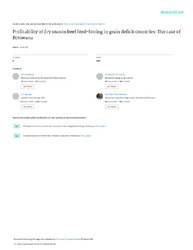Profitability of dry season beef feed-lotting in grain deficit countries: the case of Botswana
Date
2007Author
Malope, P.
Tsopito, C.M.
Aganga, A. A.
Madibela, O.R.
Metadata
Show full item recordAbstract
In grain deficit countries such as Botswana, the costs of feed may render beef cattle feed-lotting uneconomical
because of competition with human for grains. An experimental trial was conducted with forty-nine beef cattle
comprising of indigenous Tswana, pure exotic breeds and crossbred animals in order to determine profitability of
beef feed lotting during the dry season of 2002.
The results of the study indicate that the average daily weight gain is 1.13 kg per animal. This translates into a
financial profit of P118.20 per animal for the 90 days feeding period. The economic profit per head is P48.05 for the
same feeding period. Thus, the results of the study show that feed-lotting can both be financially and economically
profitable. However, these results are highly sensitive to feed costs and prices of feeder cattle which together
comprise of 92% of the operating costs of the feedlot. For instance, the results of a sensitivity analysis carried out
indicate that a slight decrease (6%) in the selling price of finished animals will result in a zero profit.
Although small-scale feedlotting is economically viable, it is important for farmers to increase the number of
animals they keep up to a certain threshold level in order for them to obtain high profits because profits per head are
quite low.
URI
https://www.researchgate.net/profile/Othusitse_Madibela/publication/296865517_Profitability_of_dry_season_beef_feed-lotting_in_grain_deficit_countries_The_case_of_Botswana/links/56dff7d608ae9b93f79bd0db.pdfhttp://moodle.buan.ac.bw:80/handle/123456789/322
Collections
- Research articles [174]

